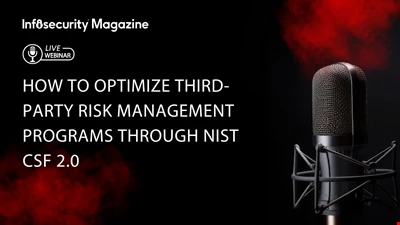Infosecurity News

FBI says iPhone tracking accusation is 'totally false'
The FBI has vehemently denied accusations that it is actively tracking iPhone users, in the wake of one million Apple Unique Device Identifiers being released online by the AntiSec hacking group.
Cambodia targeted by hacktivists over Pirate Bay arrest
Arrrrrgh: Cambodia is finding itself under attack from hacktivists protesting the arrest of one of the founders of The Pirate Bay file-sharing website. Cambodian authorities apprehended Gottfrid Svartholm Warg last week.
‘Warbiking’ enters the security lexicon
While the term is not new, the growth of WiFi is making it increasingly viable and attractive. It is the search for insecure WiFi access points by bicycle – and Sophos has been doing it around the streets of London.

Bitfloor becomes the latest hacked Bitcoin exchange
Bitfloor, one of the world’s leading online Bitcoin-to-cash exchanges, has been hacked and taken offline. It follows two earlier hacks this year on the UK trading site Bitcoinica, and has been called the fifth biggest heist of virtual currency.

Alarm bells over UK ‘Parental Internet Controls’
Today is last day for responding to the UK government’s consultation on a filtered internet. The Department of Education is proposing the introduction of a nationwide opt-out ISP-operated internet filtering system.
GOP, Dems outline cybersecurity policies – with big differences
As the Democratic and Republican National Conventions begin winding down, cybersecurity has turned up as a plank of both parties’ platforms: but with significant differences.
Government to warn business about the cyber threat
Cyber threats are growing, worsening and threatening the economy. According to the BBC, GCHQ will be outlining threats and solutions to British business at a Foreign Office conference.
What the Anonymous attacks on MI5 and MI6 tell us
As Infosecurity reported yesterday, both the MI5 and MI6 websites were attacked by Anonymous in the name of OpFreeAssange. Both sites were down for about an hour, demonstrating that few sites can withstand a concerted DDoS attack.
BitTorrent monitoring discovers file-sharers within 3 hours
A study by the UK’s Birmingham University shows that rightsholders’ direct monitoring of BitTorrent will likely lead to discovery within three hours; but suggests that the evidence gathered might not stand up in court.
DSW Shoe Warehouse awarded $8.6M in cyber-insurance payout
Time for a shopping spree? For the owners of the DSW Designer Shoe Warehouse it may be. It has been awarded $6.8 million in insurance coverage, according to a federal appellate court ruling, after a 2005 data breach that exposed transaction information from 1.4 million credit card transactions.
Swedish government websites attacked in support of Julian Assange
Government websites for the Swedish Armed Forces, Sweden.se, the Swedish Institute and the Swedish Courts have been taken down by a distributed denial-of-service (DDoS) attack, by hacktivists supporting WikiLeaks founder Julian Assange.
UK schools put kids' information at risk through faulty security policies
The safety of schoolchildren in the U.K. is at risk, according to a new study from the British Educational Research Association, which found that 48% of schools have no personal data policy implemented. That means that a range of exploitable information, including addresses, routes to school and fingerprints are easy game for hackers.
Hackers claim FBI is tracking iPhone users
Is the government spying on your latest Plants vs. Zombies session or watching what you post on Facebook via your smartphone? Some hackers say yes.
Armenian cyber-warriors target Azeri websites after Safarov pardon
A cyber-war of sorts has broken out between Armenian and Azeri hackers over the August 31 extradition and pardon of Azeri murderer Ramil Safarov.
Malicious email campaigns exploiting Java
Although Oracle rushed an out-of-band fix for last week’s 0-day Java exploit, a new sandbox bypass flaw was discovered and reported the very next day. Meanwhile, the original exploit is increasingly used in malicious email campaigns.
Sony hacked by NullCrew; Anonymous attacks MI5 and MI6
NullCrew, a new hacking group that has been particularly active over the last couple of months, has hacked Sony mobile websites – adding to its rapidly growing list of victims (Cambridge University, Yale University, Cambodia Army, PMT Air and many more).
Facebook gets tough on ‘likes’
False ‘likes’ says Facebook, benefit no-one; and the social network has started to weed them out. “We have recently increased our automated efforts to remove Likes on Pages that may have been gained by means that violate our Facebook Terms,” it announced on Friday.
Adobe releases patch for Photoshop CS6
The latest version, 13.0.1, includes two security fixes, 31 crash fixes, 18 3D feature fixes and 15 fixes to drawing and graphics features. The security fixes are deemed critical, but not pressing. The patch applies to both Windows and Mac versions.
New 2-part cyber security challenge
Cyber Security Challenge UK has announced details on the latest of its series of security challenges. The organization is sponsored by some of the UK’s most prestigious public, private and academic organizations. Its purpose is to fill the ongoing security skills gap in the UK.
Cloud Security Alliance gets large on Big Data
Providing security for virtual and remote environments that may be connected by open networks is a IT hurdle in and of itself on even a small scale, but in the context of the Big Data phenomenon stemming from cloud-based data centers, the challenge increases exponentially. To help the situation, the Cloud Security Alliance (CSA) has launched its Big Data Working Group (BDWG), to be led by Fujitsu, eBay and Verizon Business.



